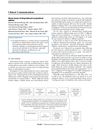 November 2024 in “Journal of Cosmetic Dermatology”
November 2024 in “Journal of Cosmetic Dermatology” Early treatment can reverse hair loss from dermal fillers.
1 citations,
July 2021 in “Veterinary Medicine and Science” A cat's skin condition was fully cured with cyclosporine A after other treatments failed.
 9 citations,
December 2022 in “Antibiotics”
9 citations,
December 2022 in “Antibiotics” Coconut seed extract may effectively treat scabies in rabbits by killing mites and reducing inflammation.
 September 1998 in “Journal of The European Academy of Dermatology and Venereology”
September 1998 in “Journal of The European Academy of Dermatology and Venereology” Auto-portraits help evaluate scalp hair.
 11 citations,
October 2015 in “Clinical and Experimental Dermatology”
11 citations,
October 2015 in “Clinical and Experimental Dermatology” Sophora flavescens extract helps hair growth and treats hair loss.

 19 citations,
August 2011 in “Archives of Dermatology”
19 citations,
August 2011 in “Archives of Dermatology” CCCA is a common scarring hair loss in African descent women, possibly linked to genetics, hair care practices, and health issues like diabetes.
 109 citations,
March 2011 in “Journal of controlled release”
109 citations,
March 2011 in “Journal of controlled release” New micelle solutions greatly improve skin delivery of certain antifungal drugs.
 41 citations,
January 2011 in “Nippon Ishinkin Gakkai Zasshi”
41 citations,
January 2011 in “Nippon Ishinkin Gakkai Zasshi” Tinea incognito in Iran commonly affects adults and mimics other skin conditions.
 27 citations,
September 2018 in “Skin appendage disorders”
27 citations,
September 2018 in “Skin appendage disorders” Hair transplantation may work for some types of scarring alopecia, but results vary and more research is needed.
 17 citations,
June 2016 in “Australasian Journal of Dermatology”
17 citations,
June 2016 in “Australasian Journal of Dermatology” Treatment with dutasteride, minoxidil, and artificial hair transplantation improved appearance but caused folliculitis.
 3 citations,
May 2020 in “JAAD Case Reports”
3 citations,
May 2020 in “JAAD Case Reports” Two patients with psoriasis grew extra hair after using certain psoriasis medications.
 151 citations,
July 2011 in “Archives of Dermatological Research”
151 citations,
July 2011 in “Archives of Dermatological Research” Liposomal systems show promise for delivering drugs through the skin but face challenges like high costs and stability issues.
 98 citations,
February 2013 in “Journal of The American Academy of Dermatology”
98 citations,
February 2013 in “Journal of The American Academy of Dermatology” Dutasteride may help stabilize Frontal Fibrosing Alopecia, but more research is needed.
 33 citations,
January 2010 in “International journal of trichology”
33 citations,
January 2010 in “International journal of trichology” Antimicrobial therapy can help manage Folliculitis Decalvans.
 32 citations,
November 2011 in “International Journal of Dermatology”
32 citations,
November 2011 in “International Journal of Dermatology” Diagnose and manage CCCA with thorough history, exams, and labs; treat with anti-inflammatory agents, stress reduction, and stopping harmful hair practices.
 19 citations,
November 2012 in “Journal of Dermatological Treatment”
19 citations,
November 2012 in “Journal of Dermatological Treatment” Isotretinoin improves severe acne without changing androgen or insulin levels but may increase body weight and triglycerides.
 15 citations,
November 2012 in “International Journal of Dermatology”
15 citations,
November 2012 in “International Journal of Dermatology” The conclusion is that hair loss from CCCA may be genetic and not solely caused by hair grooming practices.
 12 citations,
August 2017 in “Pharmaceutical medicine”
12 citations,
August 2017 in “Pharmaceutical medicine” Most doctors know the thrombosis risk with Cyproterone/Ethinylestradiol, but some lack details on less common risks and patient instructions; educational materials are underused but useful.
 11 citations,
November 2013 in “Skin Pharmacology and Physiology”
11 citations,
November 2013 in “Skin Pharmacology and Physiology” Azelaic Acid is effective and safe for treating adult female acne, with few side effects.
 11 citations,
September 2013 in “Otolaryngologic Clinics of North America”
11 citations,
September 2013 in “Otolaryngologic Clinics of North America” The document concludes that improving the appearance of posttraumatic facial scars is possible with careful treatment and realistic expectations.
 10 citations,
June 2018 in “Aaps Pharmscitech”
10 citations,
June 2018 in “Aaps Pharmscitech” The flutamide-loaded hydrogel is a promising, skin-friendly treatment for acne and hair loss, potentially requiring less frequent application.
 5 citations,
June 2021 in “JAAD Case Reports”
5 citations,
June 2021 in “JAAD Case Reports” Platelet-rich plasma therapy may help treat folliculitis decalvans but benefits might not last without ongoing treatment.
 5 citations,
April 2019 in “Dermatologic therapy”
5 citations,
April 2019 in “Dermatologic therapy” Secukinumab for psoriasis unexpectedly caused increased hair growth in a patient.
 5 citations,
September 1998 in “Atlas of the oral and maxillofacial surgery clinics of North America”
5 citations,
September 1998 in “Atlas of the oral and maxillofacial surgery clinics of North America” Hair transplantation and micrografting, used for baldness, involve moving hair follicles from hair-rich to bald areas, requiring careful procedure and post-care for success.
 4 citations,
July 2018 in “The Journal of Allergy and Clinical Immunology: In Practice”
4 citations,
July 2018 in “The Journal of Allergy and Clinical Immunology: In Practice” Four new substances—minoxidil, ferrimanitol ovalbumin, clarithromycin, and glucosamine-hydrochloride—can cause occupational asthma.
 3 citations,
August 2021 in “Cutis”
3 citations,
August 2021 in “Cutis” Some alternative medicine treatments might work for skin conditions, but their effectiveness and safety differ a lot.
 2 citations,
July 2008 in “Paediatrics & child health”
2 citations,
July 2008 in “Paediatrics & child health” Severe acne in a young girl may indicate underlying hormonal issues.
 1 citations,
September 2023 in “Rheumatology advances in practice”
1 citations,
September 2023 in “Rheumatology advances in practice” A woman's rare scalp condition worsened after using a specific arthritis medication, suggesting such medications can sometimes trigger or aggravate psoriasis.
 1 citations,
June 2017 in “Journal of the American Academy of Dermatology”
1 citations,
June 2017 in “Journal of the American Academy of Dermatology” Oral tofacitinib may be an effective and tolerable treatment for some people with severe alopecia areata.





























